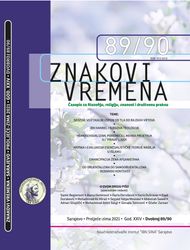Kritika i evaluacija esencijalističke teorije nasilja u islamu s akcentom na mišljenje nemuslimanskih mislilaca
Critique and Evaluation of the Essentialist Theory of Violence in Islam with Emphasis on the Views of non-Muslim Thinkers
Author(s): Mohammad Ali Mirali, Seyyed Yahya MousaviContributor(s): Mubina Moker (Translator)
Subject(s): Philosophy of Religion, Studies in violence and power, Hermeneutics, Qur’anic studies
Published by: Naučnoistraživački institut »Ibn Sina«
Keywords: Qur’an; Islam; Violence; Legitimate Violence; Illegal Violence;
Summary/Abstract: Orientalists, who are often followers of the essential theory of violence in Islam, claim that the Qur’an and Islam are inherently violent in nature, relying on a number of Qur’anic verses, narrative texts, and the historical behavior of some Muslim caliphs. The main purpose of this article is to critique and evaluate this theory from the perspective of non-Muslim thinkers and to explain the factors and backgrounds for the formation of this reading. Therefore, in this article, we will answer the question: what critiques can be made of the theory of the essentialism of violence in Islam? The research method in this paper is in terms of method of implementation, analytical method of critique, in terms of purpose, fundamental, and in terms of data collection tools, documentary and library. The research findings indicate that Islam and the Qur’an are absolutely unnecessary in relation to violence, neither do they deny it in general nor do they prove it. In the verses of the Qur’an, although legitimate violence is recognized, it has always been spoken of as the last resort. This, along with other factors, has lad to a violent reading of Islam by some thinkers.
Journal: Znakovi vremena - Časopis za filozofiju, religiju, znanost i društvenu praksu
- Issue Year: XXIV/2021
- Issue No: 89/90
- Page Range: 105-125
- Page Count: 21
- Language: Bosnian

